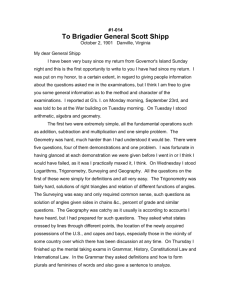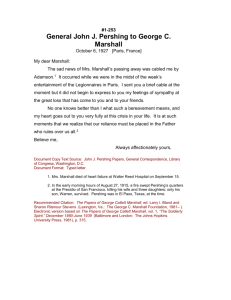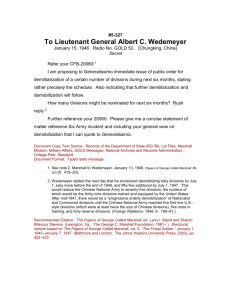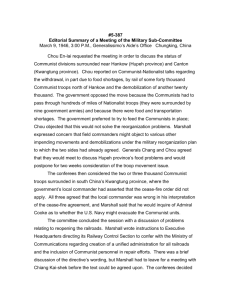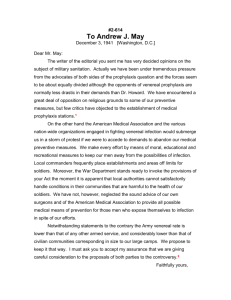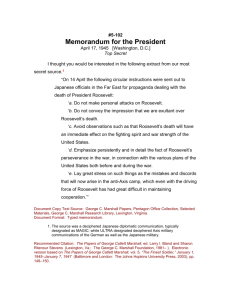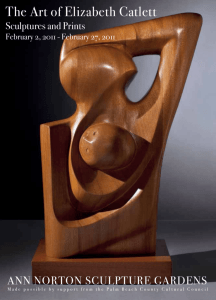5-533 - George C. Marshall Foundation
advertisement
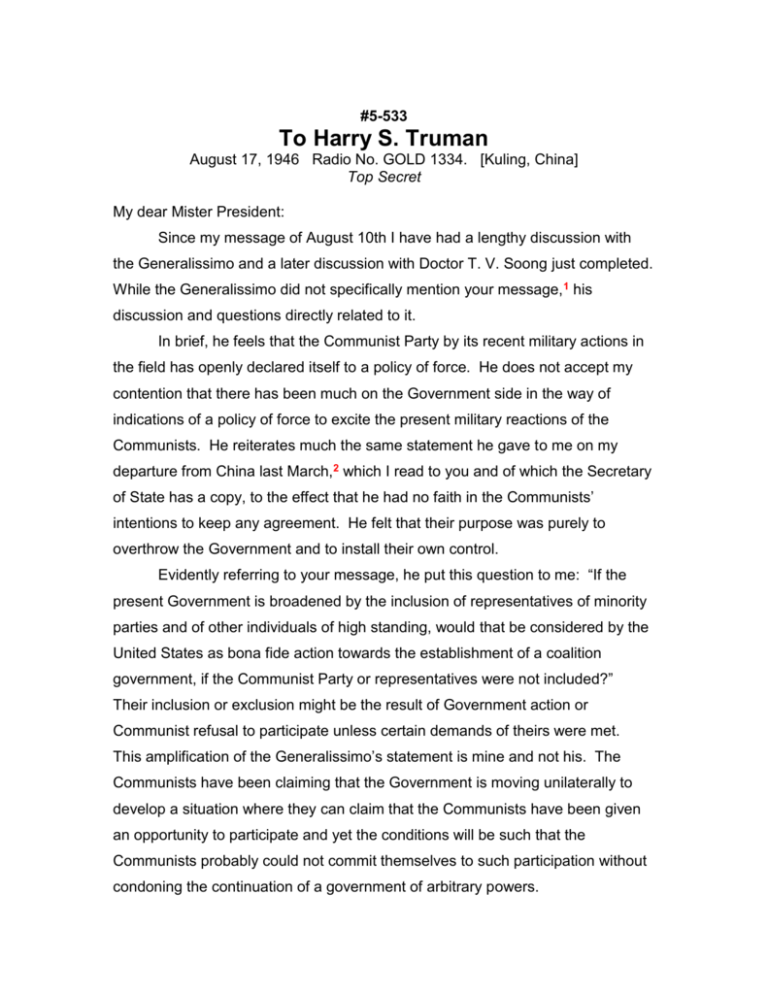
#5-533 To Harry S. Truman August 17, 1946 Radio No. GOLD 1334. [Kuling, China] Top Secret My dear Mister President: Since my message of August 10th I have had a lengthy discussion with the Generalissimo and a later discussion with Doctor T. V. Soong just completed. While the Generalissimo did not specifically mention your message, 1 his discussion and questions directly related to it. In brief, he feels that the Communist Party by its recent military actions in the field has openly declared itself to a policy of force. He does not accept my contention that there has been much on the Government side in the way of indications of a policy of force to excite the present military reactions of the Communists. He reiterates much the same statement he gave to me on my departure from China last March,2 which I read to you and of which the Secretary of State has a copy, to the effect that he had no faith in the Communists’ intentions to keep any agreement. He felt that their purpose was purely to overthrow the Government and to install their own control. Evidently referring to your message, he put this question to me: “If the present Government is broadened by the inclusion of representatives of minority parties and of other individuals of high standing, would that be considered by the United States as bona fide action towards the establishment of a coalition government, if the Communist Party or representatives were not included?” Their inclusion or exclusion might be the result of Government action or Communist refusal to participate unless certain demands of theirs were met. This amplification of the Generalissimo’s statement is mine and not his. The Communists have been claiming that the Government is moving unilaterally to develop a situation where they can claim that the Communists have been given an opportunity to participate and yet the conditions will be such that the Communists probably could not commit themselves to such participation without condoning the continuation of a government of arbitrary powers. Doctor Soong read to me his draft of a proposed answer to your message. To what extent it will be modified I do not know. It can mean much or little depending on whether or not a renewed negotiation this coming week with Doctor Soong participating along with me can be productive of a basis for the cessation of hostilities. At the present moment the Generalissimo seems clearly inclined to a policy of force as the only acceptable solution. I have made very plain my belief that no political negotiations are possible while fighting is going on and that the fighting can be terminated unless it is allowed to spread beyond control. I pointed out that a general conflagration virtually invites Communistic expansion and Soviet infiltrations, that the situation here must be considered in close connection with the negotiations in Paris.3 This is a dictated statement hurriedly made to catch a plane that is about to leave for Nanking. I will advise you further in greater length following the meeting I anticipate with General Chou and Doctor Soong probably Tuesday. Document Copy Text Source: Records of the Department of State (RG 59), Lot Files, Marshall Mission, Military Affairs, GOLD Messages, National Archives and Records Administration, College Park, Maryland. Document Format: Typed radio message. 1. See Marshall to Acheson, August 10, 1946, Papers of George Catlett Marshall, #5-528 [5: 651–52]. 2. See Marshall Memorandum for the President, March 13, 1946, Papers of George Catlett Marshall, #5-395 [5: 502–3]. 3. Delegates from twenty-one nations (Britain, China, France, the U.S., and the U.S.S.R. plus sixteen smaller allies who had fought in the European war) had begun meeting at Luxembourg Palace in Paris on July 29 for the purpose of negotiating peace treaties with Bulgaria, Finland, Hungary, Italy, and Romania. For the proceedings of the Paris Peace Conference, see Foreign Relations, 1946, vols. 3 and 4. This conference finally adjourned on October 15, after passing a total of ninety-four recommendations, which were given to the Council of Foreign Ministers (Britain, France, the U.S., and the U.S.S.R.), which considered the recommendations at a meeting in New York in November and December 1946. The treaties were finally signed on February 10, 1947. Recommended Citation: The Papers of George Catlett Marshall, ed. Larry I. Bland and Sharon Ritenour Stevens (Lexington, Va.: The George C. Marshall Foundation, 1981– ). Electronic version based on The Papers of George Catlett Marshall, vol. 5, “The Finest Soldier,” January 1, 1945–January 7, 1947 (Baltimore and London: The Johns Hopkins University Press, 2003), pp. 658–659.
